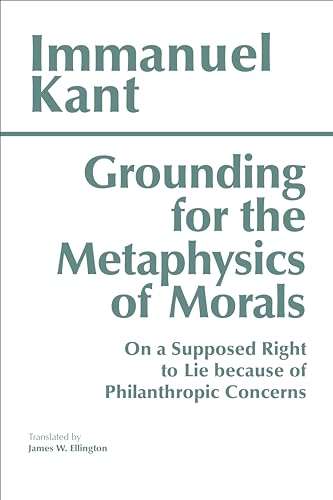
Grounding for the Metaphysics of Morals
Check my rate
| Main centres: | 1-3 business days |
| Regional areas: | 3-4 business days |
| Remote areas: | 3-5 business days |

| Main centres: | 1-3 business days |
| Regional areas: | 3-4 business days |
| Remote areas: | 3-5 business days |
Published by Hackett , 1993, softcover, index, 78 pages, condition: very good.
This expanded edition of James Ellingtons preeminent translation includes Ellingtons new translation of Kants essay Of a Supposed Right to Lie Because of Philanthropic Concerns in which Kant replies to one of the standard objections to his moral theory as presented in the main text: that it requires us to tell the truth even in the face of disastrous consequences. When I was studying this book there were no copies available to buy for some reason - but then I found it in the local library in a hard back edition printed in the 1930s or something. I borrowed it and showed it to my lecturer and he said, "You ought to steal that - they only charge you what it cost the library to buy and that would have been cents back then." I said, "You want me to steal a book on morality?" Needless to say, he was much better at lecturing on Neitzsche.
This is a remarkably difficult book to read - not as hard as some of Kant's other works - the Critique of Pure Reason *which I've started many times - and will probably start many times more) should only be attempted with fear and trepidation - all the same, it repays the effort. The main problem is Kant's endless sentences - he is the Henry James of the philosophy world. Some feel that his categorical imperative - act in a way that allows you to imagine the maxim that is guiding your action could be used as a universal law for anyone needing to act in similar circumstances (my longer than Kant take on it) is a fascinating basis for building a morality.
Some say that the categorical imperative is just the Christian golden rule written in a way that makes it hard to follow. The golden rule not being 'he who has the gold makes the rules', but rather 'treat others as you would be treated yourself'. There is something to that, but I think it is a little more interesting when Kant does it. The idea that other people should be treated like ends and not means seems to me to be as good a basis of a moral system as anyone has, as yet, come up with. I'm terribly fond of Kant, almost protective of him, not because I think he is the greatest philosopher of all time, but because he was what we would today consider a boring little man who never left his home town, but thought remarkable thoughts. He even worked out why the solar system is a flat disk shape - pretty cool, if you ask me. He had world changing thoughts in some ways.. I would go so far as to say that understanding his idea that one cannot know the thing-in-itself is perhaps one of the core ideas in understanding virtually all philosophy after him. you were thinking of starting reading Kant and weren't sure where would be a good place to make such a start this wouldn't be too bad a book to buy. The other place to look, perhaps, is the Critique of the Judgement which is quite an easy read (for Kant) and fascinating stuff on taste - taste in art, that is.